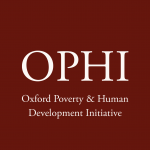Monday January 18th, 2021
10:00 AM-11:15AM EST
Paper Description:
This paper provides an extensive sensitivity analyses of the global multidimensional poverty index (MPI), a counting-based measure of acute poverty covering over 100 developing countries. Empirically, the paper probes the sensitivity of poverty measures and comparisons to modifications in key parameters. Outcomes studied include the adjusted headcount and headcount ratios and their subnational rankings, as well as the exact set of people who are identified as poor. The parameters that are adjusted include the poverty cutoff, weights or deprivation values, and indicators. Multidimensional poverty measures are generated using 10 alternative poverty cutoffs, 231 alternative weighting schemes, and six alternative indicator selections, in addition to the global MPI baseline specifications. The present paper also suggests ‘second-order’ sensitivity analyses to deepen the understanding of the underlying methods by varying poverty cutoffs and indicators simultaneously.
Broadly speaking, the results suggest that parameter choices can make a difference, which is consistent with the fact that often dominance results may not emerge. Specifically, the evidence suggests that fundamentally different parameters may substantially change the performance of the entire poverty measure or even its very nature (e.g., for a union cutoff or extreme weighting schemes). However, the results also suggest little sensitivity of outcomes when changing parameters within plausible ranges. One implication of these results is that sensitivity analyses in poverty measurement have a central role in the initial process fixing the parameters, in which usually numerous stakeholders participate, including policymakers and experts alike. The reason is that an agreement on a range of values is easier to achieve than on one particular number. An important technical insight is that union-based measures are more sensitive than the base-line measure, e.g., with respect to indicator selections.
About the Presenter:
 Nicolai Suppa is currently postdoctoral researcher at the Centre for Demographic Studies in Barcelona and Research Associate with the Oxford Poverty and Human Development Initiative (OPHI) at the University of Oxford. He holds a PhD in economics from TU Dortmund in Germany, where he also studied economics and sociology. His research interests are best described as applied welfare economics, including multidimensional poverty measurement and analysis, research on subjective well-being, the capability approach, labour economics, and applied econometrics. Nicolai has published articles in the Journal of Economic Behavior & Organization, Social Choice & Welfare, Empirical Economics, and the Journal of Human Development and Capabilities. At OPHI he is co-leading the estimation of the global MPI since 2018 and editing the OPHI Working Paper Series.
Nicolai Suppa is currently postdoctoral researcher at the Centre for Demographic Studies in Barcelona and Research Associate with the Oxford Poverty and Human Development Initiative (OPHI) at the University of Oxford. He holds a PhD in economics from TU Dortmund in Germany, where he also studied economics and sociology. His research interests are best described as applied welfare economics, including multidimensional poverty measurement and analysis, research on subjective well-being, the capability approach, labour economics, and applied econometrics. Nicolai has published articles in the Journal of Economic Behavior & Organization, Social Choice & Welfare, Empirical Economics, and the Journal of Human Development and Capabilities. At OPHI he is co-leading the estimation of the global MPI since 2018 and editing the OPHI Working Paper Series.
About the Discussant:
 Monica Pinilla-Roncancio is a Physiotherapist with a Master’s degree in Economics from Universidad del Rosario. She has also a Master’s degree in Health Economics, Policy and Law from Erasmus University Rotterdam, Netherlands. She finished her PhD in Social Policy at the University of Birmingham, UK. From 2016 to 2018 she was as a Postdoctoral Researcher at Universidad de los Andes and currently is an Assistant Professor at the same university. She is the Co-director of Metrics and Policy at OPHI and has been working in OPHI since 2014. She coordinates the work in Latin America, East Asia and some countries in Africa and Middle East. Her main research interest are disability, multidimensional poverty, inequality and health economics.
Monica Pinilla-Roncancio is a Physiotherapist with a Master’s degree in Economics from Universidad del Rosario. She has also a Master’s degree in Health Economics, Policy and Law from Erasmus University Rotterdam, Netherlands. She finished her PhD in Social Policy at the University of Birmingham, UK. From 2016 to 2018 she was as a Postdoctoral Researcher at Universidad de los Andes and currently is an Assistant Professor at the same university. She is the Co-director of Metrics and Policy at OPHI and has been working in OPHI since 2014. She coordinates the work in Latin America, East Asia and some countries in Africa and Middle East. Her main research interest are disability, multidimensional poverty, inequality and health economics.
 Dr Suman Seth is an associate professor at the Leeds University Business School. He joined the business school in 2015. He is also a Research Associate at the Oxford Poverty and Human Development Initiative (OPHI) within the Oxford Department of International Development at the University of Oxford. He obtained a PhD degree in Economics from Vanderbilt University in the USA. After his PhD, he served as a Research Office and as a Senior Research Officer at OPHI between 2010 and 2015. He is primarily interested in Development Economics with a particular emphasis on measurement methodologies and policy-oriented applications. Previously, he has served as consultants to the Regional Bureau of Latin America and the Caribbean, United Nations Development Programme (UNDP), to the Development Research Groups at the World Bank, and to the Asian Development Bank.
Dr Suman Seth is an associate professor at the Leeds University Business School. He joined the business school in 2015. He is also a Research Associate at the Oxford Poverty and Human Development Initiative (OPHI) within the Oxford Department of International Development at the University of Oxford. He obtained a PhD degree in Economics from Vanderbilt University in the USA. After his PhD, he served as a Research Office and as a Senior Research Officer at OPHI between 2010 and 2015. He is primarily interested in Development Economics with a particular emphasis on measurement methodologies and policy-oriented applications. Previously, he has served as consultants to the Regional Bureau of Latin America and the Caribbean, United Nations Development Programme (UNDP), to the Development Research Groups at the World Bank, and to the Asian Development Bank.
About the Moderator:
 James E. Foster is the Oliver T. Carr, Jr. Professor of International Affairs, Professor of Economics, and Co-Director of the Institute for International Economic Policy at the George Washington University. He is also a Research Associate at the Oxford Poverty and Human Development Initiative at Oxford University. Professor Foster’s research focuses on welfare economics — using economic tools to evaluate and enhance the wellbeing of people. His work underlies many well-known social indices including the global Multidimensional Poverty Index (MPI) published annually by the UNDP in the Human Development Report, dozens of national MPIs used to guide domestic policy against poverty, the Women’s Empowerment in Agriculture Index (WEAI) at USAID, the Gross National Happiness Index of Bhutan, the Better Jobs Index of the InterAmerican Development Bank, and the Statistical Performance Index of the World Bank. Prof. Foster received his PhD in Economics from Cornell University and has a Doctorate Honoris Causa from Universidad Autonoma del Estado Hidalgo (Mexico).
James E. Foster is the Oliver T. Carr, Jr. Professor of International Affairs, Professor of Economics, and Co-Director of the Institute for International Economic Policy at the George Washington University. He is also a Research Associate at the Oxford Poverty and Human Development Initiative at Oxford University. Professor Foster’s research focuses on welfare economics — using economic tools to evaluate and enhance the wellbeing of people. His work underlies many well-known social indices including the global Multidimensional Poverty Index (MPI) published annually by the UNDP in the Human Development Report, dozens of national MPIs used to guide domestic policy against poverty, the Women’s Empowerment in Agriculture Index (WEAI) at USAID, the Gross National Happiness Index of Bhutan, the Better Jobs Index of the InterAmerican Development Bank, and the Statistical Performance Index of the World Bank. Prof. Foster received his PhD in Economics from Cornell University and has a Doctorate Honoris Causa from Universidad Autonoma del Estado Hidalgo (Mexico).

